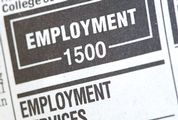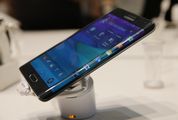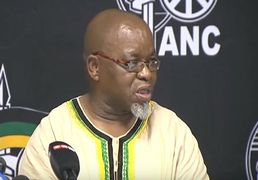DROPPING corruption charges against President Jacob Zuma was a signal that the National Prosecuting Authority (NPA) would never again use its "enormous powers" to influence who would be SA’s president.
This is the argument that was advanced by Mr Zuma’s lawyers in the High Court in Pretoria on Wednesday, the second day of the "spy tapes" case.
Advocate Kemp J Kemp SC said that for the NPA to use its "enormous powers to try and decisively influence the outcome of a presidential race" would be an affront of the criminal justice system and to the people of SA.
The timing of the indictment was "no trifling matter", said Mr Kemp. The choice of president was of great importance to how SA was governed.
Mr Zuma is fighting the Democratic Alliance’s (DA’s) court bid to set aside the 2009 decision to discontinue prosecution against him.
If the DA succeeds, this would open the possibility of Mr Zuma facing charges once again.
Former acting prosecutions head Mokotedi Mpshe dropped the charges on the grounds of "an abuse of process".
Recordings of intercepted phone conversations between former NPA head Bulelani Ngcuka and erstwhile Scorpions boss Leonard McCarthy appeared to reveal that the two had colluded on the timing of Mr Zuma’s indictment to influence the outcome of the African National Congress’s 2007 elective conference in Polokwane.
However, the DA argued on Tuesday that Mr Mpshe’s decision was irrational in law.
Mr Kemp said even the head of the prosecution team, Billy Downer, "a hardened trial lawyer" who had not cried when the case against Mr Zuma had earlier been thrown out by a court, broke down in tears when he heard about what Mr McCarthy had done.
Mr Downer understood the gravity of Mr McCarthy’s conduct, as did Mr Mpshe and others in the NPA, said Mr Kemp.
The fact that Mr McCarthy’s machinations had not worked did not change the enormity of the abuse, he said.
This was "exactly" what Supreme Court of Appeal Justice Louis Harms had in mind in a judgment in which he found that it would be a breach of principle of legality for the prosecution service to use its powers for "an ulterior purpose".
Mr Kemp said Mr Mpshe had been sending a message to everyone in the government and the public that this would never happen again.
The court might not agree that Mr Mpshe’s reaction was the right one, "but you cannot say that reaction was irrational", he said.
Mr Kemp also rejected the DA’s argument that Mr Mpshe did not properly consider the strength of the case against Mr Zuma as "dead in the water". Mr Kemp said that when Mr Mpshe announced his decision, the former acting prosecutions head made it clear that he had considered the input of the prosecution team, which had wanted the prosecution to go ahead because there was a strong case.
Both Mr Kemp and Advocate Hilton Epstein SC, for the NPA, argued that if the high court were to grant the DA the order it sought, this would not automatically mean that the charges against Mr Zuma would be reinstated.
Mr Epstein distinguished between the decision to discontinue the prosecution and the withdrawal of the charges, which happened in court two days later.
He said that if the court set aside the decision, as the DA had asked, this would mean that a fresh decision would have to be made.
It would be a breach of the separation of powers for the court to order the charges be reinstated as this fell within the discretion of the NPA.

Jacob Zuma. Picture: REUTERS/STEFANIE LOOS
DROPPING corruption charges against President Jacob Zuma was a signal that the National Prosecuting Authority (NPA) would never again use its "enormous powers" to influence who would be SA’s president.
This is the argument that was advanced by Mr Zuma’s lawyers in the High Court in Pretoria on Wednesday, the second day of the "spy tapes" case.
Advocate Kemp J Kemp SC said that for the NPA to use its "enormous powers to try and decisively influence the outcome of a presidential race" would be an affront of the criminal justice system and to the people of SA.
The timing of the indictment was "no trifling matter", said Mr Kemp. The choice of president was of great importance to how SA was governed.
Mr Zuma is fighting the Democratic Alliance’s (DA’s) court bid to set aside the 2009 decision to discontinue prosecution against him.
If the DA succeeds, this would open the possibility of Mr Zuma facing charges once again.
Former acting prosecutions head Mokotedi Mpshe dropped the charges on the grounds of "an abuse of process".
Recordings of intercepted phone conversations between former NPA head Bulelani Ngcuka and erstwhile Scorpions boss Leonard McCarthy appeared to reveal that the two had colluded on the timing of Mr Zuma’s indictment to influence the outcome of the African National Congress’s 2007 elective conference in Polokwane.
However, the DA argued on Tuesday that Mr Mpshe’s decision was irrational in law.
Mr Kemp said even the head of the prosecution team, Billy Downer, "a hardened trial lawyer" who had not cried when the case against Mr Zuma had earlier been thrown out by a court, broke down in tears when he heard about what Mr McCarthy had done.
Mr Downer understood the gravity of Mr McCarthy’s conduct, as did Mr Mpshe and others in the NPA, said Mr Kemp.
The fact that Mr McCarthy’s machinations had not worked did not change the enormity of the abuse, he said.
This was "exactly" what Supreme Court of Appeal Justice Louis Harms had in mind in a judgment in which he found that it would be a breach of principle of legality for the prosecution service to use its powers for "an ulterior purpose".
Mr Kemp said Mr Mpshe had been sending a message to everyone in the government and the public that this would never happen again.
The court might not agree that Mr Mpshe’s reaction was the right one, "but you cannot say that reaction was irrational", he said.
Mr Kemp also rejected the DA’s argument that Mr Mpshe did not properly consider the strength of the case against Mr Zuma as "dead in the water". Mr Kemp said that when Mr Mpshe announced his decision, the former acting prosecutions head made it clear that he had considered the input of the prosecution team, which had wanted the prosecution to go ahead because there was a strong case.
Both Mr Kemp and Advocate Hilton Epstein SC, for the NPA, argued that if the high court were to grant the DA the order it sought, this would not automatically mean that the charges against Mr Zuma would be reinstated.
Mr Epstein distinguished between the decision to discontinue the prosecution and the withdrawal of the charges, which happened in court two days later.
He said that if the court set aside the decision, as the DA had asked, this would mean that a fresh decision would have to be made.
It would be a breach of the separation of powers for the court to order the charges be reinstated as this fell within the discretion of the NPA.
























Change: -1.54%
Change: -1.49%
Change: -2.02%
Change: -0.73%
Change: -4.01%
Data supplied by Profile Data
Change: -0.22%
Change: -0.39%
Change: -1.54%
Change: 0.00%
Change: -0.47%
Data supplied by Profile Data
Change: 0.85%
Change: 0.22%
Change: 0.57%
Change: 0.67%
Change: -0.12%
Data supplied by Profile Data
Change: -2.08%
Change: -3.72%
Change: -3.72%
Change: -3.48%
Change: -1.83%
Data supplied by Profile Data